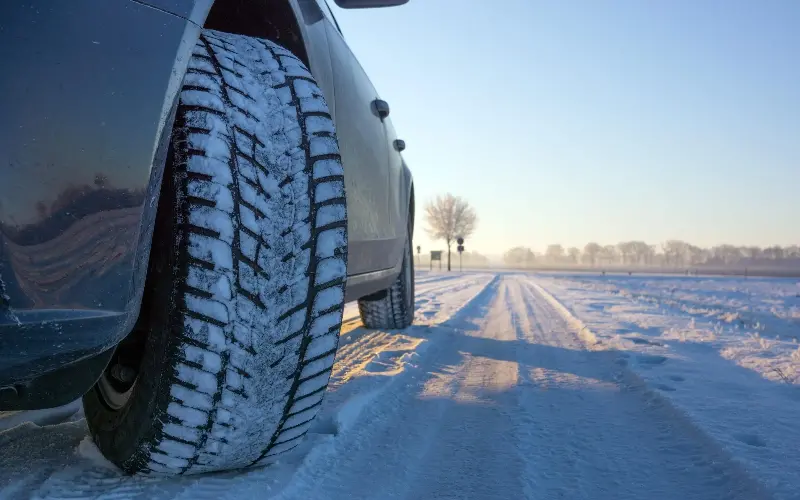
Specialist winter tyres were once the ultimate answer to snow and ice on the roads. Every autumn, we’d make the trek to a tyre shop for fresh winter rubber, featuring tread patterns and compounds formulated to provide grip in harsher weather.
We have also learned from European regulations not to take this lightly. Traditionally, our neighbours tend to take tyre choice more seriously than we Britons, the extra cost of a second set of wheels and tyres (and their storage) off-putting given the relatively mild winters in most of the UK. In Germany, for example, anyone driving frequently in snow or ice has to fit winter tyres, or face a penalty.
The burning (or, perhaps, freezing) question is: will all-season tyres suffice, since the technology has improved?
Back in 2018, a Michelin technical manager named Jamie McWhir seemed to settle the debate about whether winter tyres make sense for most drivers. Speaking to Fleet News, he said: “In about 80 per cent or 90 per cent of the tyre sizes where we have the CrossClimate+ [all-season brand], it has virtually killed off the winter car tyre demand in the UK.”
That’s clearly attractive to drivers. We can save on the installation fees which are typically around £20 per tyre – not to mention the £500 for a full set of new tyres and the inconvenience of having to store, maintain and swap them twice a year.
All-season tyres gaining traction
It’s important to know the technical difference between winter and all-season tyres, as well as how the gap has closed significantly (but not entirely) in terms of which will help you stay on the road when the weather worsens.
All-season tyres now have rubber compounds that adapt to both cold and warm temperatures and use an innovative rounded contact patch as opposed to an older, outdated square patch design, says Stratos Stratoudakis, a consultant with the automotive engineering firm Horiba Mira based in Nuneaton, Warwickshire.
“All-season tyres now maintain cold-weather flexibility by lowering the glass transition temperature while possessing the structural stability to resist the excessive wear on dry roads,” Stratoudakis says. In short, they work. Drivers will find that all-season tyres provide more than sufficient grip in the majority of conditions.
Ray Collier, an automotive engineer with London-based tyre testing firm Tread Ltd, echoed the same sentiments. “The market demand has increased due to awareness and availability of all-season tyres as well as the reduced deficit in performance,” he says, explaining that merely “being cold” should not be a determining factor to using winter tyres.
In many areas of the UK, he says, you’ll experience merely wet roads on which all-season tyres will suffice. Most of the time, winter tyres are not the best unless the conditions are more severe, he says.
The argument for winter tyres
Meanwhile, winter tyres have a unique ability to soften and flex in cold weather that will surely help those who drive in thick snow or who vacation in winter locales. Winter tyres exist because, when the temperature dips below 7C, the rubber stays soft and maintains traction.
“Quantitative testing shows a clear difference in safety margins,” says Stratoudakis, explaining how for an all-season tyre driving at 30mph, you’ll need 37 metres to come to a stop on thick snow and ice. A winter tyre on the same road in the same conditions only needs 28 metres to come to a stop at the same speed.
“That’s a difference of nearly two car lengths in an emergency,” he notes. “No all-season tyre currently closes that full performance gap.”
“The main element for drivers to consider is the kind of winter conditions they are likely to face with their vehicle and for how long,” says Joe Brammer, a technical manager at Michelin.
“If they regularly encounter snowy roads, drive in very low temperatures, live in or often travel to areas which are difficult to reach in winter (such as steep slopes or ungritted roads), then the best option may be to use winter tyres.”
The type of car has an effect
In summary, all-season tyres now perform exceptionally well in both cold and warm weather. Many drivers in the UK will only experience wet and cold roads but not heavy snow. Winter tyres, however, provide better stopping distances if there is thick snow and ice.
There’s a much more practical consideration, however. Setting aside any European regulations, winter rubber may be exactly what the tyre doctor ordered if you own a front-wheel-drive vehicle or prefer the peace of mind that comes from improved stopping power on icy roads.
“A front-drive car with dedicated winter tyres will significantly outperform an all-wheel-drive car on summer tyres and sometimes on all-season tyres,” says Stratoudakis. “This is because stopping distance is dictated purely by the tyre. All-wheel-drive offers no advantage in braking.”
In fact, improved stopping distance in winter is one reason the UK could consider legislating this issue once and for all. All-season tyres have closed the gap, certainly, but in the more extreme conditions winter tyres will provide the greatest peace of mind.
Driving style matters
Another consideration concerns how you drive. Stuart Lovatt is the director and chair of tyre safety charity TyreSafe, based in Colchester, Essex. Apart from the kind of rubber touching the road, drivers should know that no modern technical innovation can prevent an accident.
Winter tyres may provide some assurance on icy roads, but ultimately it is the responsibility of the driver to take into account to the prevailing conditions.
“A driver with snow tyres must still adjust their driving style to the conditions by reducing speed and increasing following distance,” says Lovatt.
“Overconfidence, even with winter-specific tyres, is a major cause of incidents in challenging weather. Ultimate safety is always a combination of the right equipment [the tyre] and the right driving behaviour [the driver].”
So the tyres you choose have an impact on performance – but they are not foolproof.
The Telegraph verdict
Case closed? As with most things, the answer is highly dependent on your needs, where you drive and even how you drive.
The technology for all-season tyres has certainly improved in recent years, but the debate is still raging.
One key point is that all-season tyres will meet the needs of most drivers in the UK, especially those in warmer climates in southern areas.
Yet, for those who may drive frequently in heavy snow and ice – mostly in northern England near the Pennines and the Lake District, the Scottish Highlands and in parts of Wales – dedicated winter rubber makes more sense.
There is no definitive answer: most drivers will likely not need winter tyres, but some definitely do.
